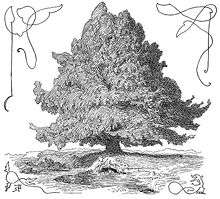Baduhenna
In Germanic paganism, Baduhenna is a goddess. Baduhenna is solely attested in Tacitus's Annals where Tacitus records that a sacred grove in ancient Frisia was dedicated to her, and that near this grove 900 Roman soldiers were killed in 28 CE. Scholars have analyzed the name of the goddess and linked the figure to the Germanic Matres and Matronae.
Etymology
The first element of the goddess's name, Badu-, may be cognate to Proto-Germanic *badwa- meaning "battle." The second portion of the name -henna appears as -henae in the names of matrons, Germanic goddesses widely attested from the 1st to 5th century CE on votive stones and votive altars. Rudolf Simek states that the goddess's name etymology implies that the goddess is associated with war, and Simek points out that sacred groves are commonly associated with the Germanic peoples.[1]
Attestation
Baduhenna is solely attested in book 4, chapter 73 of Tacitus's Annals. In chapters 73 and 74 of Annals, Tacitus describes the defeat of the Roman army in ancient Frisia:
|
Original Latin (1st century CE):
|
Church and Brodribb translation (1876):
|
See also
- Tamfana, another Germanic goddess mentioned by Tacitus in his Annals
- Nerthus, a Germanic goddess mentioned by Tacitus in his Germania
- "Isis" of the Suebi, an apparently Germanic goddess mentioned by Tacitus in his Germania
Notes
- Simek (2007:26).
- Frost (1872:226).
- Church and Brodribb (1876:148).
References
- Church, Alfred John. Brodribb, William Jackson (Trans.) (1876). Annals of Tacitus. MacMillan and Co.
- Frost, Percival (1872). The Annals of Tacitus. Whittaker & Co.
- Simek, Rudolf (2007) translated by Angela Hall. Dictionary of Northern Mythology. D.S. Brewer. ISBN 0859915131
